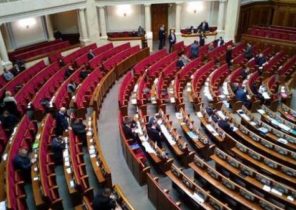
The world has become more “flat”. Our planet is inhabited by 7.5 billion people, of which 2 billion users of Facebook. He previously worked as a rule of six degrees of separation, thanks to Facebook them now was only 3.2. According to my estimates, at the end of 2018 will be about two. You will need two handshakes to get, for example, to trump. As he wrote to Sergei Kapitsa, growing complexity, and communication of those 7.5 billion people, becoming “flat” complicate the world. Now everyone is connected with everyone, and it’s scary. The influence of social networks on our lives is huge.
Trust is a core value. And we don’t trust anyone. Any new voiced suddenly, the thesis divides people into two approximately equal groups. For example, one of the most urgent topics – weapons. Ask the liberal party – they’re for legalization or against? It turns out that they share 50: 50. Ask about earth: you need to open the land market or not? And it seems that spoke for the legalization of weapons should be in favor of opening the land market. But no! On two issues the society is already divided into four approximately equal parts. All decisions are made exclusively emotionally, by the principle “mine is mine”. Someone said their opinion – I just compared mine or not mine. Some feedback went internal, “lamp lit” is mine. So out of the media, friends. All the time there is a “division”. Everyone trusts himself and has their model of the world, universe, country. To find a second person, which would be exactly the same picture, very difficult. All crumbled – economiseurs.
“Zrada” very good odds. The credibility of positive information is less than 30%, to negative – sometimes up to 80%. As only reported some negative, for example, “we have a falling economy,” the credibility of this information, people feel Supreme. If you say the same about the growth of 4% in the fourth quarter – there is mistrust. Negative information creates a wave, and positive it does not run. People faced with poor service, put forward the demand: “the Guilty must be punished”, and it is directly supported. But if you hear the thesis: “Good service should be rewarded” – he’s perceived as advertising. Believe negative and positive likes only very close friends.
Ratings a lot, and the value of their no. In 2005 it was possible to include a “Flank 20” to “Gala-radio” and determine what music to listen to. “Oscar” was a benchmark in the world of cinema. Now Facebook ask you: “What do you think about this?”, and get controversive opinions. All the experts will tell you everything. Get 20 opposite very well reasoned opinions. Some are written very clearly and precisely – and you realize that this is the work of bots to form an opinion. And you’re not able to determine what is valuable and what is not. So now people are beginning to characterize the person, who gives them information: friend or not, his or someone else’s. And then decide how to treat this information.
Is audience segmentation. This is clearly seen on the example of the gadgets. When Nokia launched its line-up, she defeated Motorola by one simple principle: the company would like to “split” people into certain groups and each of them suggested your phone type. They taught the people to “put the phone on the table”, and it is possible to identify the person’s status. Then Apple broke this trend. The company said: “You’re all the same, just have their own and others”. Their are those who with Apple. This is a clear model of football clubs. You’re rooting for the football club not because he wins but because he’s yours. And Apple is your ecosystem that you drew. Next came the confrontation: your – Apple-others – Samsung.
Now inside the “their” went crack. “Their” can not agree. We have always had a problem: where two Ukrainians – three Hetman. And yet there is such a format in business: “I don’t believe you – you know because I “throw”. And knowing that you have a “throw”, I should “throw” you before. So I’ll “throw” before we agree”. This model is a little broke under the pressure of absolute lack of competitiveness: we have learned to agree, somewhere there was a professional Association. The idea is that the Maidan was to strengthen this tendency was the desire to be together and to negotiate. Now it again subsided, because it turned out that still there are nuances – and the nuances of Ukrainian somehow places higher than the agreement in principle. Because of the nuances now any collapse of the democratic Association. And for the people no confidence points, no points justice: no courts, law enforcement trust, the minimum, the President’s rating drops – where to go?
The desire of uniqueness. Again, back to the gadgets. Apple ended because it ended one perfect phone – we began to dress in pouches, again to personalize. Personification is happening now – everyone wants to differ from the rest. Important to my opinion in Facebook – I exist only if I have followers. And followeth me will be if I say not that all the rest, and Express a different, interesting point of view. We go from similarity to uniqueness. In small towns this happens at least because there are strong paternalism. Social networks just antipaternalism: I don’t trust anyone, so affect me any. To survive in Facebook, you must have critical thinking. This implies that you have not exactly come together, you’re the atom. And then the atoms will start to be linked by thin threads and fractals – the circle of trust.But still this does not occur, while any attempt to Facebook fails because it starts to break off twigs.

Facebook now is no longer regular. He will be replaced by some new system of communication, but it will be worse. Facebook is still flooded with people, but later it will be crowded with bots, and then artificial intelligence. We’ll have an entirely different model of thinking, means and methods of communication. Man will have to learn to work and live with the bots and robots that operate according to the algorithm and have artificial intelligence. This is already happening. Now bots are mostly people, not robots. But, for example, by messengers of their many. They are in call-centers. And in 2017-2018 robots will increasingly appear in our lives. The proliferation of artificial intelligence – a matter of a few years.
Be built a lot of systems people management. Analyzers emotional state already. All tools retract and control the behavior. And as you say, write, you can analyze the emotional state. And sell at the right time that “the pill” in the form of information that is suitable to your condition, turning to his supporter. By 2020, IBM is planning to launch the analyzer of mental health according to the letter. They are already testing early prediction of Alzheimer’s, Parkinson’s. Thanks to Big Data is the ability to analyze data about the person. For example, come to the hotel – and there is already information who you are. And that in the years 2017-2018 will be built many systems people management.
The social network was too long out of control. Now it created the tools that allow you to take control, but they are expensive. And while Facebook is constantly changing protocols that show people and Google “holds” on his contextual advertising, politicians to influence on the Internet and the audience is still difficult. But as for the money you can create any number of bots who work for the destruction of the image, to control the situation in two ways. The first was not to close, not to piss me off, and to speak with an opponent and turn it into an ally. The second option is to demonize the opponent. That is to take an object that’s attacking you, and explain to everyone why he does it. And argue better than he does. In fact you knock out the ground from under his feet: “Why did he attacked us? Because he paid for it.” In fact, you’re going to expose it. This technique used policy. For example, the story of Serhiy Leshchenko, a typical discrediting a decent man. “What kind of a fighter against corruption, who is not known for what the money bought the apartment?” And everything it is normally hard “to wash”, as if he was trying to prove something. Why? Because attack. War is good when you’re guaranteed to win. But war often leads to the fact that both die. All pulling each other to the bottom.
The truth is, of course, very good. But the truth is now weak in social networks. To strengthen it, we need to find supporters, playing on emotions that affect other layers of value. If to not defend themselves in the model of negative and positive, it is necessary to focus on values. “Encroached on my health”, “Lost puppy!”, “I stole the baby!” – it’s all part of the value. Then you get strong support and konsolidierung other people. Or they say: “There are people who say “but” – they are looking to the past. And there are those that say “b” — they are looking to the future. Who do you?” It is clear that “b” is the future, and went support. That is taking itself to the database the correct value, you can certainly get support.
All imposed ageism – not feminism and not gender, and age inequality. Previously, young people were always lower in status than the older generation. Now you’re a PhD in 60 years, there are rewards – and no one needs you professionally. Because there are young startups who, even on the job will not take a distinguished Professor. Everything turned upside down. On the one hand, young people want everything now, and people 50+ and even 40+ are losing their jobs. Professions becomes smaller. People need to be creative, relax, and work should robots. But we’re not quite ready. Americans, for example, to such things actively preparing, realizing that ageism is a serious problem
The new trend is personalization. Now the major manufacturers are going the way of personalization. For example, Coca-Cola bottle does. In Belarus there is a company Belwest, which manufactures shoes for a specific person. They have a 3D printer for the sole printer for printing on the skin with the ability to put any image. And the cost is comparable to the mass ordering in China.
A new profession is about art, creativity, science, searching, learning. The singularity Institute says that in approximately 20 years will disappear 80% of the professions. For example, why will need accountants if the accounting will be automated. PR people and journalists some time will be “live” because they create the content. But on the other hand, robots poets already good at writing poems, a robot-lawyer wins more cases than the usual specialist. But still the robots do not new – they compile. But we expect from artificial intelligence, what he will be able to create to produce content. When he starts to create content, the problems arise from journalists and marketers. Farmer conditionally become a programmer, because everything will be automated. The technology will be such that the processor will work independently. European countries are going to get rid of gasoline cars until 2035. Where is electric – there’s the autopilot. In the next 20 years we are no will be different from Europe, because it will be in the same context. Over the next five years we will significantly lag. Young people now need to learn in the first place human technology: critical thinking, creativity. These are the main meanings and skills. And become a narrow specialist. To actually learn physics, biology, to seek the joints between the different disciplines is also creative. The profession of bankers is for the next 10 years. After the banks will become unnecessary, because there are PayPal, blockchain, allowing to do without them.







